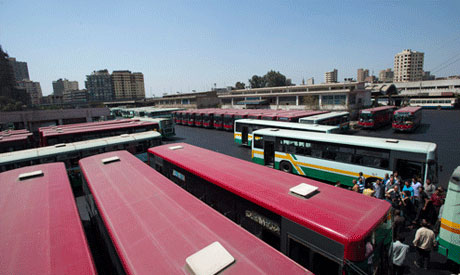
Cairo bus drivers (Photo by Bassam El-Zoghby)
An increase in the price of fuel will not affect public transport costs, Egyptian government officials stated in the face of public concern after the prices of subsidised gasoline were raised on Friday night.
Egypt raised the prices of three widely used petroleum-derived fuels, octane 80 gas, octane 92 gas, and diesel, by up to 78 percent.
Cabinet spokesperson Hossam Gaweesh announced that public transportation, including Cairo metro fares, would not be affected by the price hikes.
Fares for privately run transport services, such as microbuses and taxi cabs, are expected to increase between 2 and 7 percent, according to estimates released by state-run statistics body CAPMAS on Friday.
But Egyptians noticed otherwise on Friday morning, reporting much larger price hikes from microbus drivers who are a popular alternative to the over-burdened public transport system but are unregulated by the state.
“This morning I was charged LE1.5 to get from Bulaq El-Dakroor to El-Isaaf (in central Cairo), instead of the usual LE1,” Ahmed Mohamed, a young waiter in the upscale Cairo neighbourhood of Zamalek, told Ahram Online.
In a press conference on Friday, Prime Minister Ibrahim Mahlab said that the government had tasked provincial governors to have microbus stops monitored in order to keep a lid on fares.
The governorate of Giza announced a fine of LE500 on drivers who raise fares by over 10 percent, while authorities in Cairo will fine anyone charging over 8-12 percent more than the old fares.
CAPMAS also estimates that the effect of the 64 percent increase in the price of diesel, used by trucks, will also be minimal, raising transport costs by 2 to 5 percent, only.
The fuel price rise is designed to meet the government's set target of cutting state fuel subsidies by LE44 billion in the fiscal year which began on 1 July, as part of an effort to rein in the budget deficit to 10 percent of GDP.
Short link: